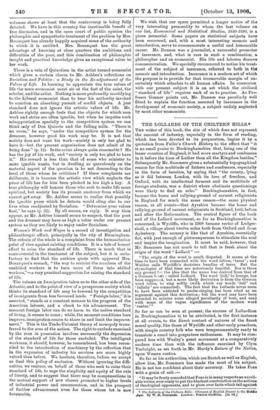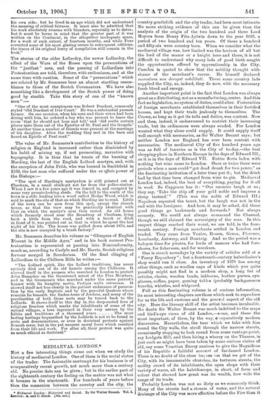THE LOLLARDS OF THE CHILTERN HILLS.* THE writer of this
book, the size of which does not represent the amount of industry, especially in the form of reading, which has been devoted to its preparation, begins it by a quotation from Fuller's Church History to the effect that " it is no small praise to Buckinghamshire that, being one of the lesser counties of England, it had more martyrs and confessors in it before the time of Luther than all the Kingdom besides." Subsequently Mr. Summers gives a substantially topographical reason for this multitude of fathers and confessors, especially in the form of heretics, by saying that " the county, lying as it did between London, with its love of freedom, and Oxford, with its intellectual ferment and its multitude of foreign students, was a district where obstinate questionings were likely to find an echo." Buckinghamshire, in fact, became the home and rallying-ground of earnest religionists in England for much the same reason—the same physical reason, at all events—that Ayrshire became the home and rallying-ground of earnest religionists in Scotland, both before and after the Reformation. The central figure of the book and of the Lollard movement, so far as Buckinghamshire is concerned, is Wycliffe, who in 1368 became rector of Ludger- shall, a village about twelve miles both from Oxford and from Aylesbury. The scenery is like that of Ayrshire, essentially flat, with just enough of picturesqueness to stimulate the soul and inspire the imagination. It must be said, however, that Mr. Summers has not much to tell that is fresh about the origin of the word " Lollard " :-
" The origin of the word is much disputed. It seems at the time to have been connected with the word lolium, `tares'; and Walden calls Wycliffe's doctrines bundles of tares. But the etymologies of that time are notoriously fanciful. Nor is there any ground for the idea that the name was derived from that of a German h. tet.c called Lolkard. The word 'iloll,' to lounge, bas been suggested, but a more likely derivation is from the German word lollen, to sing softly (with which our words lull' and lullaby' are connected). The fact that the Lollards never seem to have been addicted to psalm-singing has been cited as an argument against this derivation ; but the word may have been intended to satirise some alleged peculiarity of tone, and used with some of the vague significance of the modern word 'ranter.' "
So far as can be seen at present, the success of Lollardism in Buckinghamshire is to be attributed, in the first instance at all events, to the direct contact of natures of the finest moral quality, like those of Wycliffe and other early preachers, with simple country folk who were temperamentally ready to translate a creed into gregarious enthusiasm. It may be com- pared less with Wesley's great movement at a comparatively modern time than with the influence exercised by Clym Yeobright, as set forth in Mr. Hardy's Return of the Native, upon Wessex rustics. So far as his authorities, which are Scotch as well as English, allow him, Mr. Summers has made the most of his subject. He is not too confident about their accuracy. He takes Foxe with a grain of salt :—
"It may be freely conceded that Foxe is in many respects an unreli- able writer, ever ready to put the blackest construction on the actions of theological opponents, and to gloss over facts which tell against • The Lollards of the Chiltern Hills : Glimpses of English Dissent in the Mselits Ages. By W. H. Bummers. London: Broads Griffiths. [3s. 6d.] his own side ; but he lived in an age which did not understand the meaning of critical fairness. It must also be admitted that his work absolutely swarms with blunders, especially as to dates ; but it must be borne in mind that the greater part of it was written on the Continent, in the altogether inadequate space, for a work of such extent, of fourteen months, and while Foxe corrected some of his most glaring errors in subsequent editions, the traces of its original hurry of compilation still remain in the book."
The stories of the older Lollardry, the newer Lollardry, the effect of the Wars of the Roses upon the persecutions of
the "justfast" men, and the passing of Lollardism into Protestantism are told, therefore, with enthusiasm, and at the same time with caution. Some of the "persecutions" which are related by Mr. Summers bear an almost startling resem- blance to those of the Scotch Covenanters. We have also something like a development of the Scotch power of doing good by stealth. Take this story of one of the " known men" :— " One of the most conspicuous was Robert Durdant, commonly styled 'Old Durdant of Iver Court.' He was a substantial yeoman farmer. On one occasion, when his sons and their wives had been dining with him, he ordered a boy who was present to leave the room that he should not hear and tell,' and did recite certain places unto them out of the Epistles of St. Paul and the Gospels.' At another time a number of friends were present at the marriage of his daughter. After the wedding they met in the barn and heard an Epistle of Paul read."
The value of Mr. Summers'a contribution to the history of religion in England is increased rather than diminished by Lis habit of mixing up, if not permeating, narrative with topography. It is thus that he treats of the burning of Harding, the last of the English Lollard martyrs, and, with the exception of John Frith, who was burned in Smithfield in 1533, the last man who suffered under the ex officio power of the Bishops :- " The spot of Harding's martyrdom is still pointed out at Chesham, in a small chalk-pit not far from the police-station. When I saw it a few years ago it was fenced in, and occupied by some very prosaic-looking sheds. On the hill to the south of the town is a stile leading into a wood called Hodge Wood, which is said to mark the site of that on which Harding sat to read. Little of the town can be seen from this spot, except the church tower, so that the view may be practically identical with that on which the martyr's eyes then rested. An old house which formerly stood near the Broadway at Chesham, lying back a little from the road, and with a brook or ditch in front of it, was pointed out as that in which be spent the last night of his life. The house was pulled down about 1870, and the site is now occupied by a brush factory."
Mr. Summers describes his volume as " Glimpses of English Dissent in the Middle Ages," and in his book earnest Pro- testantism is represented as passing into Nonconformity, much as, according to Carlyle and Mr. Barrie, Scotch religious fervour merged in Secederism. Of the final clinging of Lollardism to the Chiltern Hills he writes :—
" The Lollard spirit, like the Lollard traditions, has never entirely died out of its old haunts among the Chilterns. It showed itself in the yeomen who marched to London to protect John Hampden on the threatened arrest of the Five Members, and in the Greencoats who marched under the same patriot's banner with its haughty motto, Vestigia nulla retrorsum. It showed itself not less clearly in the patient endurance of persecu- tion by the early Baptists and by the peaceful Quakers whose remains lie beneath the linden-trees of Jordans, and many of the peculiarities of both these sects may be traced back to the Lollards. It shows itself to this day in the deep-rooted love of religious freedom which marks the inhabitants of some of the upland villages, a love ingrained in their very nature by the habits and traditions of a thousand years The most lasting heritage bequeathed by the Lollards is not to be found in sects and denominations, or even in doctrinal protests against Romish error, but in the yet unspent moral force which resulted from their life and work. For after all, their protest was quite as much ethical as doctrinal."











































 Previous page
Previous page